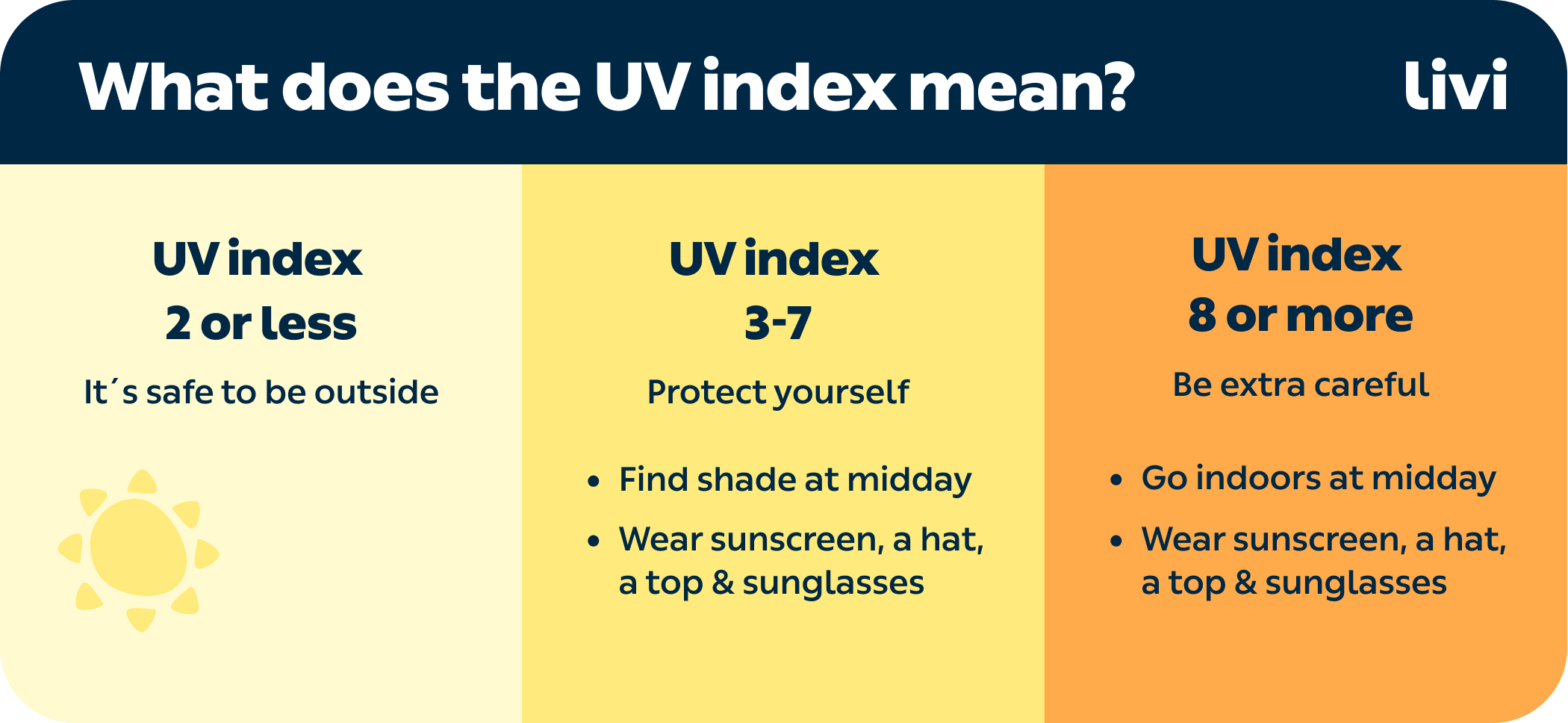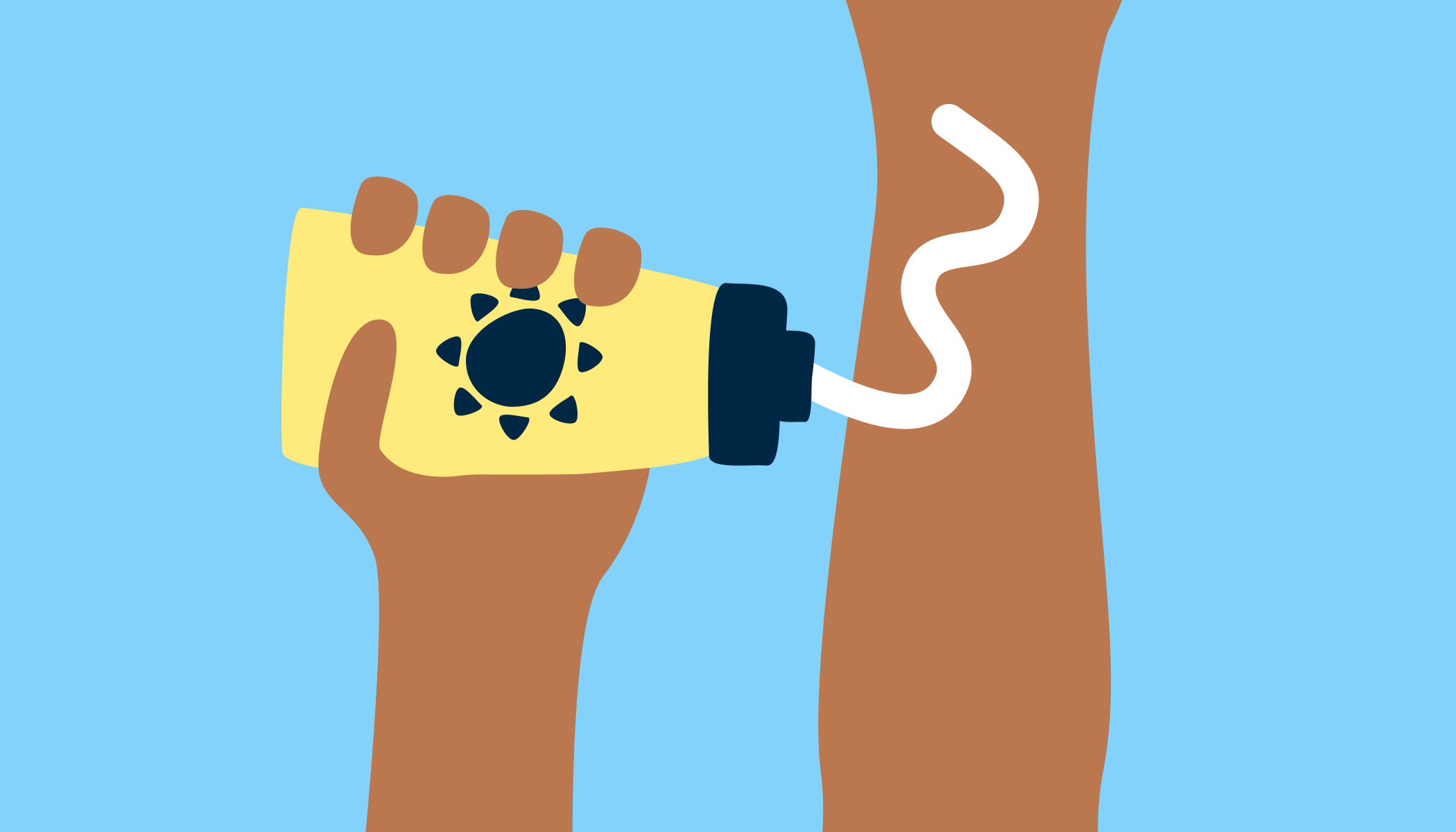When temperatures soar in spring and summer, many of us head out to make the most of the sun’s rays. But it’s no secret that too much direct sunlight can be dangerous.
‘Getting a healthy dose of sunshine is important for both our mental and physical health, but we should all be aware of taking precautions when spending time in direct sunlight,’ says Dr McClymont.
Why is sun safety so important?
‘Without the right level of protection, direct sunlight can cause severe sunburn. This can be very painful and lead to more serious side effects, including a greater risk of developing skin cancer,’ Dr Rhianna explains. ‘That’s why it’s essential to follow advice on sun safety.’
According to figures from Cancer Research UK, there are around 2,300 melanoma skin cancer deaths in the UK every year, which is more than 6 each day.
Although not every case of skin cancer is preventable, you can reduce your risk of developing it by following sun safety advice and avoiding getting sunburned.
What are UV rays?
Ultraviolet (UV) radiation is a type of energy emitted by the sun and some man-made sources like tanning beds.
There are 3 types of UV rays:
- UVA: longer wavelength rays that penetrate deep into your skin
- UVB: shorter wavelength rays that only reach the outer layer of your skin
- UVC: rays from the sun that don’t reach the Earth’s surface, but can come from man-made sources like lamps

What’s the UV index?
The WHO created the ultraviolet index (UVI)1 to measure the amount of UV rays reaching Earth during the day. The higher the number, the more intense the UV rays.
You can usually find the UVI for your area in your local weather reports. For example, in Paris, the maximum UVI typically ranges from 0-1 in winter, 3-6 in spring, 6-7 in summer and 2-6 in autumn.
What affects your UV exposure?
- Geography: UV rays are more intense the closer you are to the equator.
- Altitude: At higher altitudes, there’s less atmosphere to absorb UV rays, so UV radiation is more intense. With every 1,000 metres of altitude, UV levels increase by about 10%.
- Time of year: Summer brings the strongest UV radiation.
- Time of day: UV rays are most intense when the sun is at its highest point in the sky, from around noon to 2pm.
- Cloud cover: In general, clouds weaken your UV exposure – but don’t underestimate a cloudy day. Light cloud cover may actually intensify UV levels because of an effect called scattering.
- Reflection: UV rays bounce off reflective surfaces like snow, sand, pavements and water, adding to your UV radiation exposure. Fresh snow is particularly reflective and can double your UV exposure.
Who is most at risk of sunburn?
People of all ages can get sunburn from spending too much time in the sunshine, as this is actually a form of light radiation. When talking about the health of our skin, there are two main types of ultraviolet to be aware of – UV light UVA and UVB. Together, they contribute to the chance of getting sunburn.
Some people are more prone to burning in the sun than others – especially those with moles or paler skin. Redheads are also more vulnerable to the effects of the sun as well as those who work outdoors.
‘Sunburn can be particularly dangerous for babies and small children, and so exposure to the sun should be carefully limited for little ones,’ Dr McClymont adds.
How to prevent sunburn
- Remember your sunscreen – aim for SPF 50+
- Try to avoid the sun from 11am to 4pm when UV rays are at their strongest
- Make use of shaded spots, but keep in mind that shade from trees, umbrellas and canopies do not offer complete sun protection. To avoid getting sunburn, apply sunscreen even while in the shade
- Wear protective clothing for optimum sun safety, like a wide-brim hat and loose-fitting clothes
- Watch the UV Index (UVI) to plan your time outdoors. The higher the UVI, the more potential for sunburn or skin damage
What’s the best way to treat sunburn?
‘Sunburn can usually be safely managed at home, but there are a few exceptions. If your sunburn is so severe it’s caused blistered or swollen skin, or you have other symptoms associated with your sunburn like a high temperature, headache, dizziness, nausea or muscle cramps then, it’s best to chat to a GP,’ Dr McClymont advises.
‘It’s also more important to protect sunburned skin while it’s healing, so if you’re already sunburnt, make sure you double up on your sun safety.’ Dr McClymont shares important things to remember when treating sunburn:
- When you get sunburn, your skin is damaged, so the first thing you need to do is stay out of the sun.
- You can calm down your skin and relieve itchy sunburn with a cool shower or bath – but make sure the water isn’t too cold, especially for children.
- Use a soothing moisturiser designed for sensitive skin to give your sunburn relief. There are lots of creams available for mild sunburn over the counter, often containing aloe vera.
- Sunburn, as well as hot weather, can make you prone to dehydration so drink lots of fluids.
- For treating bad sunburn, painkillers and anti-inflammatories like ibuprofen can help give relief.
- If your skin develops a sun blister (filled with clear liquid), leave it alone. They usually burst or leak easily as the skin is fragile, but it’s not a good idea to burst them yourself.
- As sunburned skin or sunburned lips begin to heal, they can often become very itchy, and the top layer of damaged skin begins to peel. Try not to scratch or peel the skin, as this can cause more damage. Simply keep itchy skin hydrated with a moisturiser.
How to keep children safe from sun damage
It can be hard to keep active children out of the sun, so make sure they’re covered up as much as possible and are aware of the risks – if they’re old enough to understand. As children get older and more independent, it’s a good idea for them to play a part in their own sun safety.
Children’s skin is more delicate than ours, and the more often they burn, the more likely they are to develop skin cancer in later life.
Always use a high factor sunscreen for parts of the body that can’t be covered up. The label should state that it protects against both UVA and UVB rays. For children, it’s best to use at least factor 50 sunscreen for the best protection, and reapply it frequently – at least every two hours, or more often if it washes off.
Babies under 6 months should not be in direct sunlight at all. If small children or babies do get really bad sunburn, they can become very unwell, very quickly.
Make sure your child gets an urgent medical assessment if you’re worried about their sunburn.
What are the health benefits of the sun?
Spending time in the sunshine can be good for us too. As well as increasing the level of serotonin in our bodies, known as the ‘happiness hormone’, the sun has plenty of other health benefits.
Vitamin D
This is the time of year when we can get the most vitamin D through sunlight. It helps keep our bones, teeth, muscles and immune system healthy. Vitamin D supplements are often recommended by doctors for those who live in less sunny areas, as well as those at risk of vitamin D deficiency.
Better mental health
Getting outside on a nice day can make all the difference to how we feel. Sunshine is closely linked to improved mood, and even clearer thinking, particularly in people with depression. Another important reason to make sure we all enjoy the sun safely.
Improved sleep cycle
It might seem obvious but experiencing sunlight in the daytime helps our bodies know the difference between night and day – and regulate our sleep patterns. This is all part of your 24-hour biological cycle known as the circadian rhythm that plays a big part in nearly all bodily processes.
Relief from skin conditions
Sunshine in moderation – even as little as 5 minutes – can create visible short-term improvements to certain skin conditions like acne, eczema and psoriasis.


